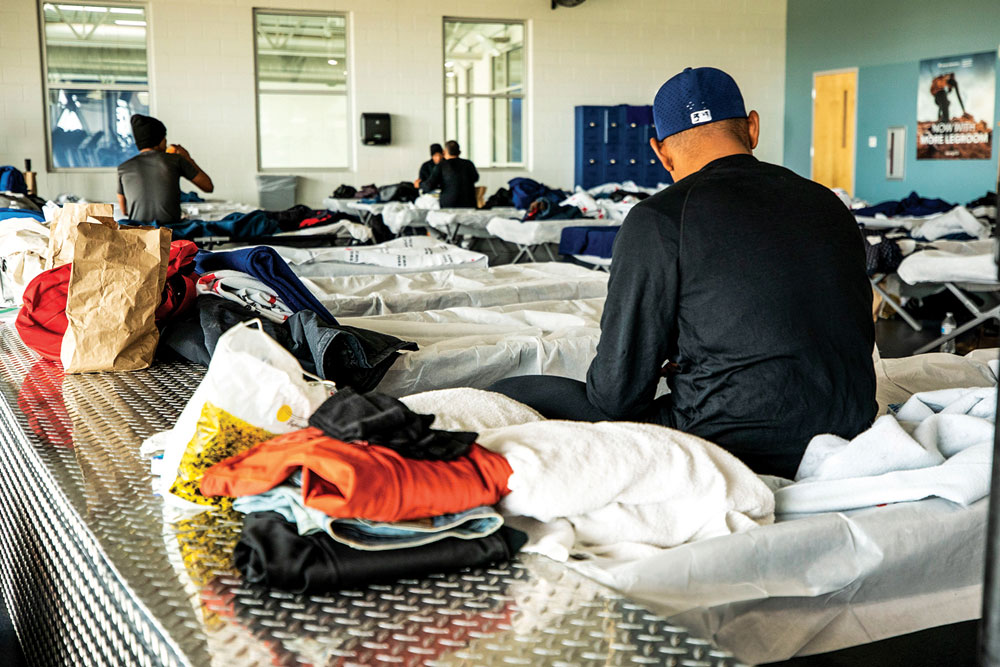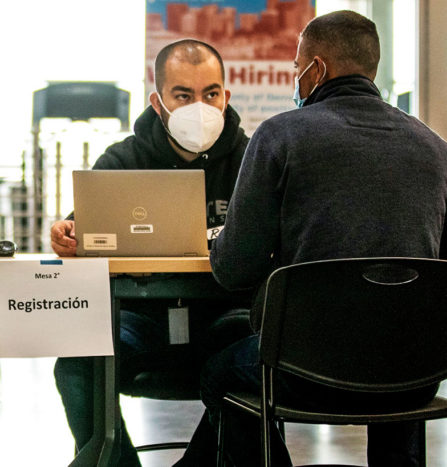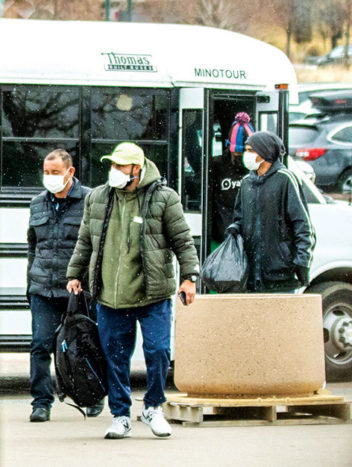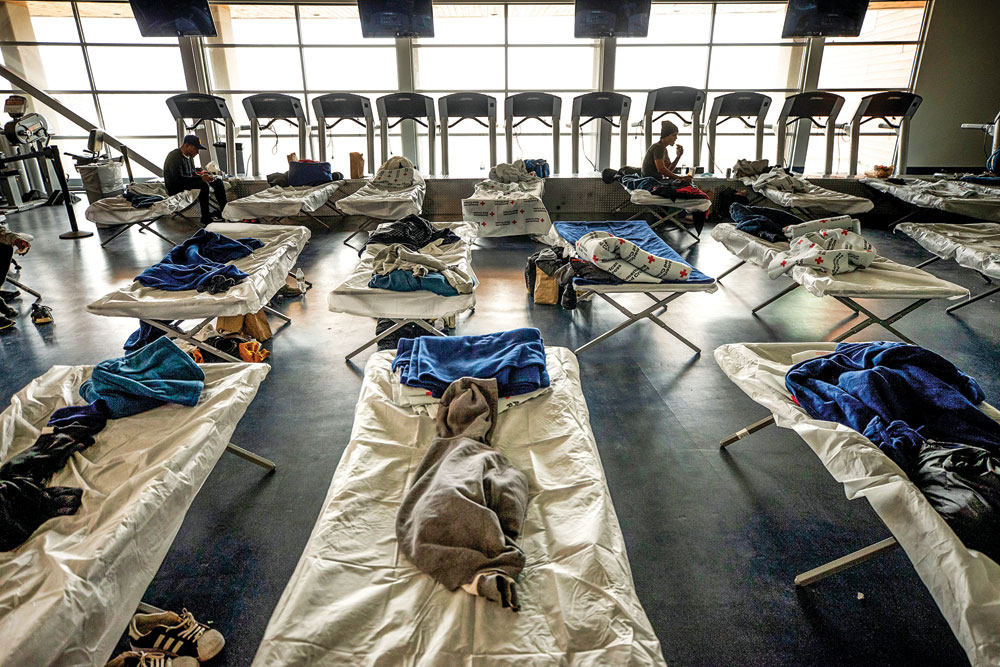
After traveling several months from Venezuela to Denver, many migrants arrived malnourished from the insufficient food and unsanitary water. The EOC believes that the most common reasons for choosing Denver include our proximity to the border, our compassion for immigrants, or the presence of family members.
In December, Denver faced the unexpected challenge of providing shelter and resources for an influx of migrants from Central and South America. The first wave occurred on Dec. 5, when approximately 50 migrants arrived at Union Station by bus and then walked to the Denver Rescue Mission near downtown. With Denver unprepared for their arrival, the city activated the Emergency Operations Center (EOC) to plan a response, and it was decided that city rec centers would be used to shelter the migrants. The city has requested that news media not announce the specific rec centers that are being used as shelters to maintain the security of the facilities, though residents are drawing their own conclusions as they find their usual rec center closed.

City staff and rec center workers have been fulfilling various roles inside the shelters, including registering the newly-arrived migrants.
The EOC has determined that most migrants are originating from Venezuela, crossing at the El Paso border, and then riding buses into Denver. Although the December influx began with modest numbers, in the recent weeks the surge increased substantially. From Dec. 9 to Dec. 22, approximately 140 migrants were arriving each day for a total of 1,431 migrants—and Mayor Hancock issued an emergency declaration to obtain more resources. As of Dec. 22, Denver had allocated $2 million from the general fund to support the migrant response, and the city announced that it was at 69 percent of its maximum shelter capacity.
“Denver has basic emergency response plans, and if we need emergency shelters, rec centers are on the list of city buildings and resources that are employed in those situations,” says Jill Lis, the spokesperson for the Emergency Operations Center (EOC). The EOC is comprised of city workers who represent different government departments and collaborate to address emergency situations. The EOC’s responsibilities include gathering information, implementing strategies, accumulating resources, and coordinating with community organizations.

The city has been using rec centers to provide shelter and resources for the influx of migrants who have been arriving in Denver since the beginning of December.
“Everybody’s watching the national news and seeing what’s happening at the southern border, and so we don’t expect this surge to abate anytime soon,” says Lis. “But we don’t know how long and how significant the surge will be, and so we’re taking the temperature and keeping tabs on the situation every day.” The EOC attributes this uncertainty to the migrants using social media to plan their trips. If the bus plans were arranged by state or local governments, Denver could communicate with those entities and anticipate incoming buses. But the migrants are coordinating the trips themselves on social media platforms, which makes it hard to track when buses will arrive and how many migrants are approaching.
The city recently established a reception center to register the newly arrived migrants and direct them to the appropriate shelters. The size of the gymnasiums and the features in the buildings make rec centers workable spaces to house migrants and provide for their basic needs. While some non-profits house a few migrants, given their limited space, the vast majority are being accommodated at rec centers.
One rec center served as the primary shelter throughout the December surge, with approximately 300 migrants being housed there. “For the most part it is very organized,” says Lilia Chavez, a professional translator who helped the Spanish-speaking migrants communicate with the city staff members. “It’s a mix of men, women, and children all in one big room with cots. But it’s very clean, and they’re also providing the migrants with showers, bathrooms, food, laundry, and private spaces.”

Rec centers have been useful as shelters because the large facilities can hold hundreds of cots for the influx of migrants plus they contain other beneficial features, including bathrooms, showers, kitchens, private spaces, and laundry machines.
Talking to the migrants has afforded Chavez with insight regarding the general mood in the shelter and the mixed emotions of the individuals. “They’re happy and thankful that they’re here and that we have resources. One of them couldn’t believe that we also have public libraries with free resources. But they’ve also been functioning out of survival mode for four months now, so for a lot of them it’s been traumatic and difficult. They’re just trying to figure out the next move, and you can sense that in their energy and stress levels.”

Professional translator Lilia Chavez worked in the rec center to help Spanish-speaking migrants receive medical treatment from Denver Health, legal advice from city lawyers, and basic resources from the rec center staff. Chavez says that working with migrants and hearing their stories was an emotional experience. Front Porch photo by Christie Gosch
Chavez’s job as a translator is to help the migrants explain their backgrounds, receive health care services, and consult with lawyers. But she has found the migrants’ stories to be especially moving. “Some of them are ex-government employees. Then when they no longer wanted to cooperate with the negative aspects of the Venezuelan government, some had to leave the country and some were prosecuted. Those were the hardest stories to hear because they used to be part of the government, they had an opinion about how it was run, and then they were prosecuted for that.”
Chavez was also struck by the difficulty of the migrants’ journey in fleeing their country and traveling to Denver. “Some of them traveled for months through Columbia, El Salvador, and Mexico just to get here. And some of them also had to leave their children behind because they couldn’t travel through the jungle with small kids. But they also can’t go back to Venezuela to see them, and so their hope is to work while they figure out a way to reconnect with their kids.”
Although most migrants are eager to work so they can provide for their families and contribute to the community, bureaucratic obstacles can hinder them from being able to achieve this goal. “They just want to work, but the asylum process is not easy,” says Chavez. “It takes five months to get asylum, and in the meantime they’re in limbo because they can’t work until they receive a work permit, and so a lot of them don’t know what to do.”
The city has also been determining how to address the situation and provide more resources. Winter clothing is one resource that is direly needed, as the migrants were dressed in summer clothing to cross the hot jungle and now need winter attire to endure the colder temperatures.
Denver is also struggling with a severe staffing shortage. On Dec. 14 the city designated two more rec centers as emergency shelters, but the staffing levels in the shelters have not been able to keep up with the rising volume of migrants. “Up until this point we have just been activating city staff,” says EOC spokesperson Jill Lis. “Rec center workers and city staff employees are being tasked with working 8 to 12 hour shifts in this difficult and stressful scenario. They’re doing everything from keeping the shelter clean to serving the food to checking folks in, and so they’re doing these basic duties just to keep things running.”
The EOC is now seeking help to fill the positions, manage the shelters, and assist the migrants. “We see that the need isn’t going to go away and that we’re going to be here for a while,” says Lis. “So we need to start filling that gap with other types of staff, and we’ve just opened paid shelter-assistant positions.”
The EOC has also specified the details of the temporary shelter positions. The jobs are expected to last until the end of March, the workload usually requires about 24-39 hours per week, and the pay rate for all positions is $25 an hour. Anyone interested in working at an emergency shelter can apply for a role at the Office of Emergency Management website.
Donations can be dropped off at the Iglesia Ciudad de Dios at 5255 Warren Ave. Denver, CO 80227 (Drop-off times are Tuesdays and Wednesdays between 4 and 7pm).
Photos courtesy of the Joint Information Center


0 Comments